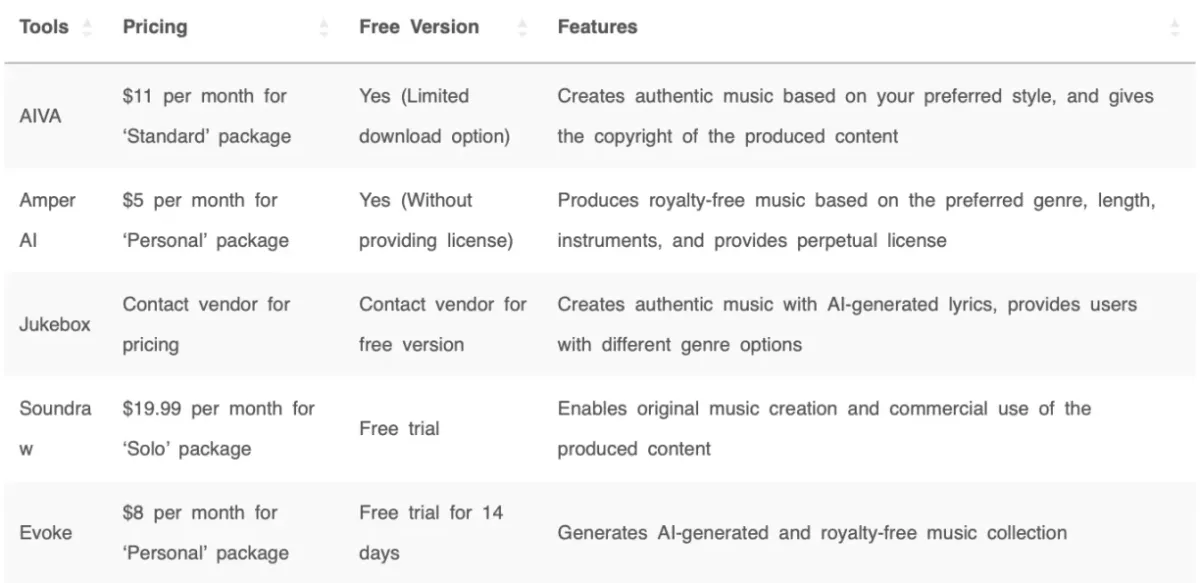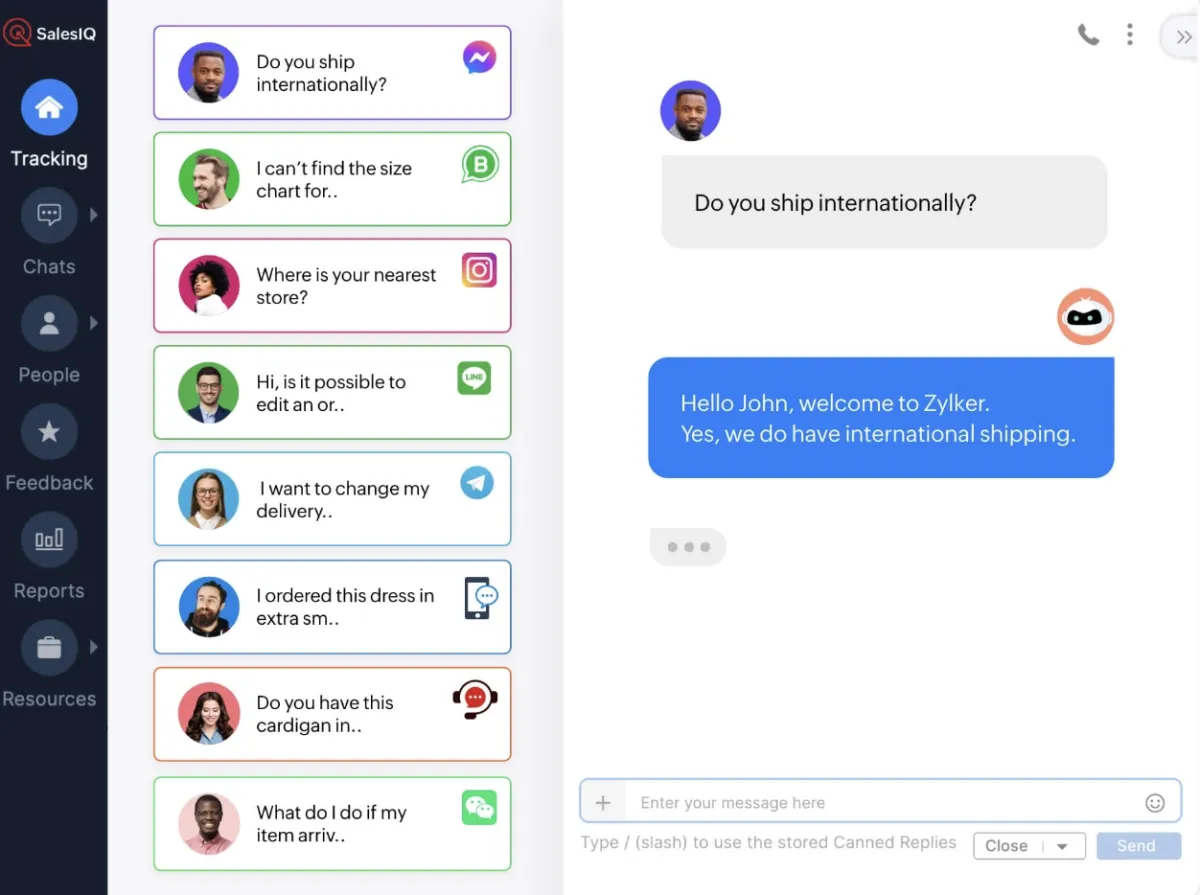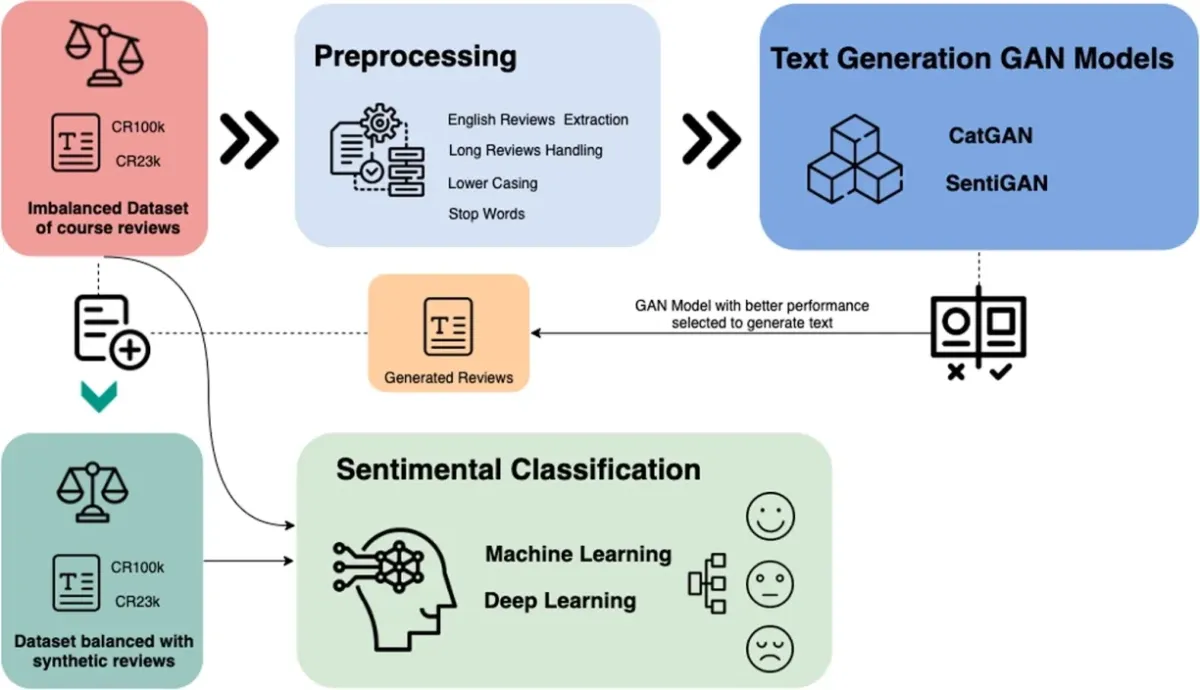The artificial intelligence market in marketing, valued at around 15.84 billion USD in 2021, is projected to soar past 107.5 billion USD by 2028, reflecting its rapidly increasing role in the sector..1 As generative AI is the leading factor in AI technology, the interest in generative AI has been growing across many industries, including marketing.
Check out to learn generative AI use cases and the benefits of leveraging generative AI in marketing campaigns.
Top 8 use cases of generative AI in marketing
1. Text generation
Text generation and copywriting using generative AI can be a powerful tool for marketing efforts. AI-generated content enhances marketing strategies by reducing repetitive tasks with content automation for marketing teams and enabling strategic planning for targeted marketing campaigns. These AI-generated texts can be used for a variety of purposes other than generating ideas, such as:
- Content creation: AI tools analyze historical data and consumer behavior to suggest content ideas aligned with current market trends. This data-driven approach enables marketing leaders to make strategic decisions about marketing content creation. These contents can be in the forms of emails, social media posts, blog articles, etc.
- Script writing: By leveraging generative AI models and large language models, brands can develop video content and scripts that tell engaging stories by capturing user intent and enhancing customer engagement (see Figure 1). This results in AI-powered advertising strategies that align with the customer journey and drive higher conversions.
- Generating product descriptions: Through AI-generated product descriptions and landing pages, brands can provide detailed and appealing product narratives that boost customer experience and guide the customer journey effectively.

Figure 1: An example of AI-generated content promoting a new electric car model, created using ChatGPT.
Real-life example: Narrato with Site Smart Marketing
Site Smart Marketing2 , a digital marketing and web development agency, faced challenges in scaling their content production while maintaining quality and adhering to brand guidelines. Collaborating with Narrato, they achieved:
- Enhanced efficiency: By integrating Narrato’s AI-driven content creation tools, Site Smart reduced their content production time by a factor of eight. Features such as custom AI templates and brand voice settings enabled the generation of on-brand content from the outset.
- Cost reduction: The integration with Narrato led to an 80% decrease in content production costs. This efficiency allowed Site Smart to reallocate resources more effectively while focusing on areas that drive greater value for their clients.
- Improved quality control: Narrato’s platform provided a centralized workspace with enhanced collaboration and reduced errors. The integration of AI ensured content consistency and alignment with brand tone while minimizing the need for extensive revisions.
2. Image generation
Image generation for marketing with generative AI involves using AI models to create tailored, high-quality visuals that align with a brand’s identity, target audience, and campaign goals.
This process helps marketers rapidly produce engaging content, customize images for specific audiences, and reduce costs and time compared to traditional design methods.
Here are a few ways to implement image generation through generative AI tools like DALL-E in marketing:
- Product imagery: By using generative AI in marketing, businesses can create highly realistic images of their products that can be used in online stores, social media, and other marketing materials. This can help to showcase products in a more engaging and visually appealing way, which can lead to increased sales and conversions.
- Visual branding: Generative AI can be used to create visual branding materials, such as logos and graphics.
- Visual try-on: Another use case of generative AI in marketing can be to create virtual try-on experiences, which allow customers to visualize how products will look on them. This can be particularly useful for fashion and beauty brands, as it can help to reduce the number of returns and increase customer satisfaction.
- Ad creative: Generative AI can also be used to create ads that are engaging and visually appealing (see the videos below to see how some famous brands leverage this). By using AI for ad creative, businesses can ensure that their ads stand out from the competition and are more likely to generate clicks and conversions.
Below are the AI-generated ad campaign videos for Heinz and Nestlé:
3. Video generation
With video generation, generative marketing can become more dynamic by allowing marketing teams to create high-quality video content that supports marketing campaigns across social media channels.
Video generation application of generative AI can be useful for marketing in:
- Video ads: With generative AI, businesses can create high-quality video ads that can be used on various platforms, including social media and video sharing sites. This can help to increase brand awareness and drive conversions.
- Product demos: Video generation can also be used to create product demo videos. By using generative AI to create these videos, businesses can showcase their products in a visually appealing way, which can help to increase engagement and sales.
However, users should be careful about the ethical concerns of generative AI regarding such use cases, like deep fakes (see the video below). There can be serious ethical problems if not monitored carefully. Check out risk of generative AI for more.
Real-life example: SimCorp with Synthesia
SimCorp, a global provider of integrated investment management solutions, collaborated with Synthesia to enhance the efficiency and consistency of their video production process. By partnering with Synthesia, they achieved:
- Accelerated production: Utilizing Synthesia’s AI-driven video creation platform, SimCorp increased their video output by five times.
- Saving time: The collaboration allowed for the creation of two 3-4 minute videos in a single day and reduced the time previously required.
- Consistent branding: Synthesia’s platform ensured that all videos maintained a consistent, high-quality brand experience that aligns with SimCorp’s guidelines.
4. Music generation
Music is an important component of many advertisements, and generative AI can be used to create ad music that is optimized for specific campaigns and audiences.
By creating music that is tailored to the needs and preferences of a particular audience, businesses can increase the effectiveness of their ads and drive more conversions:
- Human creativity and machine learning: Combining human creativity with AI’s deep learning capabilities allows brands to create unique, memorable audio experiences in marketing content, therefore giving campaigns a competitive edge.
- Ad music: Generative AI can help composing music tailored to a particular target audience to strengthen the emotional connection in advertising. AI-powered music generation can create engaging content that resonates with audience preferences and consumer behavior.

Figure 2: List of some generative AI tools for music generation.
If you are interested in other generative AI tools, check out top 35 generative AI tools by category.
Real-life example: Hydra II by Rightsify
Hydra II3 , developed by Rightsify, is an AI music generation model designed to support users to create high-quality and copyright-free instrumental music and sound effects specifically suited for commercial applications. Here are some key use cases:
- Background music for content creation: Ideal for social media, podcasts, and live streaming, Hydra II offers customizable music that enhances the viewer’s experience and aligns with the creator’s brand.
- Digital streaming platform releases: Musicians can use Hydra II to produce and release original music on platforms like Spotify, Apple Music, and more while ensuring all tracks are royalty-free and compliant.
- Soundtracks for TV, film, and gaming: Hydra II allows filmmakers, game developers, and broadcasters to create tailored soundscapes that elevate storytelling and gameplay.
5. Chatbots/conversational AI for customer service
AI-powered chatbots are valuable tools for customer service by providing 24/7 availability and multilingual support. This application of artificial intelligence helps brands engage users effectively while providing rapid responses.
- Data analysis for improvement: Conversational AI can leverage data analysis to continuously improve responses thereby enhancing the overall customer experience and reinforcing brand loyalty.
- Customer segmentation and personalization: AI systems can segment customers based on analyzing historical data and predictive analytics to tailor interactions to individual needs. This process results in a more personalized customer journey and strengthens customer interactions.
Real-life example: Zobot from Zoho SalesIQ
Zobot4 is an AI-powered chatbot platform designed to help businesses automate customer interactions on websites, mobile apps, and social media channels. Using a codeless builder, users can create and customize chatbots without needing programming skills.
Zobot integrates with other AI tools like IBM Watson, Google Dialogflow, and Microsoft Azure to enable more natural conversations. The platform supports over 30 languages to allow businesses to engage with a global audience.
With cross-platform deployment, Zobot helps ensure customer engagement across multiple touchpoints, including messaging channels like Facebook Messenger, Instagram, WhatsApp, and Telegram.

Figure 3: Zobot AI chatbot cross-channel messaging example.
6. Sentiment analysis
Generative AI can aid in sentiment analysis for marketing by creating synthetic text data that has been labeled with different sentiments such as positive, negative, or neutral. This synthetic data can be used to train deep learning models to analyze real-world text data for sentiment.
Additionally, generative AI can create text that is intentionally designed to convey a specific sentiment, such as positive or negative social media posts that could shape public opinion for marketing campaigns.
This approach can also address the issue of data imbalance in sentiment analysis of user opinions in various areas like customer service.

Figure 3: High-level overview of a sentiment classification approach.5
7. Search Engine Optimization (SEO)
By analyzing large amounts of data and identifying patterns in consumer behavior, the use of generative AI in market research can help businesses identify SEO friendly, the most relevant and high-performing keywords and phrases for their digital marketing campaigns.
Marketers can utilize generative AI tools like ChatGPT to implement SEO in their content in various ways such as:
- Generating topic ideas for content writing
- Conducting keyword research
- Finding the right titles
- Grouping search intent
- Creating content structure
Real-life example: AI Search Grader
HubSpot’s AI Search Grader6 is designed to assess brand visibility and sentiment across AI-powered search engines like ChatGPT and Perplexity. By analyzing how these models reference the brand, it provides insights into the current performance and identifies areas for improvement. Key features include:
- Brand sentiment analysis: Evaluates the tone and context in which AI models discuss the brand, offering a sentiment score to measure public perception.
- Share of voice assessment: Measures the brand’s presence relative to competitors within AI-generated search results to help users to understand their market standing.
- Reporting: Delivers a detailed analysis highlighting the brand’s strengths and weaknesses in the AI search landscape.
8. Email marketing
Generative AI is a powerful tool for email marketing by creating highly personalized and engaging content that resonates with individual users.
By leveraging large language models (LLMs) and analyzing customer data, generative AI for email marketing tools can craft tailored email texts, subject lines, call-to-action (CTA) buttons, and even personalized images.
This personalization enhances customer satisfaction and boosts key performance metrics such as open and click-through rates, ultimately driving higher conversion rates. AI-generated content, from dynamic email subject lines to product visuals, can help brands create a more targeted and relevant marketing experience.
Beyond content creation, generative AI plays a crucial role in optimizing other aspects of email marketing, such as audience segmentation and email delivery timing.
These AI powered email marketing tools can analyze vast datasets to identify distinct audience segments and predict the most effective times to send emails to ensure higher engagement.
Real-life example: The American Marketing Association with rasa.io
The American Marketing Association (AMA), a group for marketing professionals, faced challenges in engaging its large membership effectively. To address this, AMA partnered with rasa.io to utilize AI technology for creating personalized emails tailored to each reader.
This approach led to a 47% increase in weekly open rates and click rates of nearly 10% and also saved AMA over 50 hours through automated newsletter personalization. The initiative boosted website traffic, attracted new visitors, and provided valuable insights to AMA’s editorial team.
Top 5 benefits of generative AI in marketing
Generative AI in marketing can help create high-quality, relevant, and engaging content that is tailored to the needs of specific target audiences. High quality content can benefit marketers in terms of:
1. Time and budget efficiency through automation
One of the biggest benefits of using generative AI in marketing is increased time and budget efficiency it brings to content creation. The time devoted to composing marketing materials can be decreased in these ways:
- Conversational AI tools like ChatGPT can produce extensive replies in a matter of seconds, which is significantly quicker than what any human could do.
- Unlike search engines, it can evaluate the online information to present a concise summary of the answer.
- Through marketing automation and automated content generation, generative AI can eliminate the need for manual work, freeing up time for marketers and reducing the budget needed for content creation.
- By the elimination of human error and streamlining processes, using generative AI in marketing can help marketers reduce the amount of time and budget needed for certain control tasks.
2. Targeted and personalized content
Using a combination of customer data analysis, natural language processing (NLP), and machine learning algorithms, generative AI tools can create content that is specifically tailored to your target audience.
By analyzing consumer behavior and identifying patterns in their interactions with a particular platform or brand, it can generate unique content strategy to improve customer engagement, based on preferences of customers and outreach them via personalized emails and targeted social media posts.
3. Increased innovation and inspiration
Generative AI provides a powerful tool for businesses to generate innovative and inspirational marketing strategies that can help them stay ahead of the curve and achieve their marketing goals by:
- Helping businesses identify customer insights, which can be used to create marketing campaigns that are relevant and timely.
- Encouraging marketers to discover new ideas and approaches to marketing by generating creative concepts and insights that may not have been apparent through traditional methods.
- Assisting them in generating marketing concepts and ideas by drawing inspiration from the important previous experiences of others with tools like ChatGPT that cover the most of the previous online databases.
4. Scalability of content production
Generative AI in marketing can help marketing teams to rapidly create and scale AI-generated content across multiple platforms while:
- supporting targeted marketing campaigns,
- reaching a diverse target audience efficiently.
By leveraging generative AI tools and analyzing historical data, marketing leaders can deliver tailored content marketing, from social media posts to product descriptions. This level of scalability helps ensure a consistent brand message and boosts customer engagement without exhausting resources while allowing marketers to focus on strategic planning and emerging trends.
5. Cross-platform integration
Generative AI tools help marketing teams create content that is optimized for a variety of social media channels, digital ads, and customer personas, with each piece of content strategically aligned to platform-specific needs.
Whether it’s producing engaging content for social media posts, designing targeted marketing campaigns, or crafting video content and landing pages, generative marketing AI ensures that content is both consistent and relevant across platforms.
This cross-platform approach enables marketing organizations to analyze data, refine their marketing strategy, and better understand customer interactions therefore allowing marketing leaders to stay ahead in a fast-evolving landscape and connect with customers in meaningful ways.
External Links
- 1. Global AI in marketing revenue 2028| Statista. Statista
- 2. Narrato Helps Site Smart Create Content 8x Faster & Save 80% in Content Production Costs.
- 3. Hydra - AI Music Generator from Rightsify.
- 4. KI-Chatbot-Builder-Plattform | KI-Chatbots erstellen – Zobot™.
- 5. ScienceDirect.
- 6. AI Search Grader - 2025.


![Generative AI in Manufacturing: Use Cases & Benefits ['25]](https://research.aimultiple.com/wp-content/uploads/2023/07/Generative-AI-in-Manufacturing-Use-Cases-190x107.png.webp)
Comments
Your email address will not be published. All fields are required.